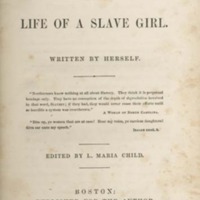Primary Sources
Title
Primary Sources
Description
Primary sources are sources written or created by historical actors. They include textual sources, like letters, diaries, and reports, as well as non-textual sources, like cartoons, paintings, and sculptures.
Collection Items
Meeting on the Formation of the American Colonization Society
Colonization was one of the first post-revolutionary movements seeking to deal with the problem of slavery in the new United States. Whites from both slaveholding and nonslaveholding states formed the American Colonization Society (ACS) in 1817 in…
Appeal to the Coloured Citizens of the World
David Walker was one of the most influential black voices of the antebellum era. Little is known about his early life. The son of a slave father and a free black mother, Walker was born in Wilmington, North Carolina, perhaps in 1796 or 1797. In…
Narrative of the Life of Frederick Douglass
The son of a slave woman and an unknown white man, Frederick Douglass (1818-1895) was born a slave in Maryland. While living in Baltimore and working at a shipyard, Douglass fled the city. He settled in Massachusetts and became the most prominent…
Incidents in the Life of a Slave Girl
Born into slavery, Harriet Jacobs (1813-1897) thwarted repeated sexual advancements made by her master for years and then ran away to the North. She later published an account of her life (under the pseudonym Linda Brent) in her autobiography,…
Letter of Thomas Jefferson to John Holmes
In this letter written in 1820, Thomas Jefferson, author of the Declaration of Independence and former president of the United States, revealed his understanding of the primary difficulty with rectifying the injustices he saw in the institution of…
The Duties of Christian Masters
Reverend A. T. Holmes of Hayneville, Georgia, wrote the following essay in response to a contest offered by the Alabama Baptist State Convention in 1849 on “the Duties of Christian Masters to Their Servants.” Holmes won $200 for this winning entry,…
Twelve Years a Slave
Solomon Northup, a resident of the free state of New York, was kidnapped and sold into slavery in 1841 while visiting Washington, D.C., where the institution was legal. After twelve years, Northup managed to contact friends in the North who secured…
The Interest in Slavery of the Southern Non-Slaveholder
During the presidential election in 1860, James D. B. DeBow (1860-1867), the publisher of the influential DeBow’s Review, campaigned in support of secession. His most famous speech, excerpted here, replied to Hinton R. Helper whose Impending Crisis…
Speech of Anthony Burns
Anthony Burns, a slave, escaped Virginia and fled to Massachusetts. He was captured and returned to slavery. He later spoke at a black church in New York in February of 1855. In this speech, published subsequently in newspapers, he gave his account…







